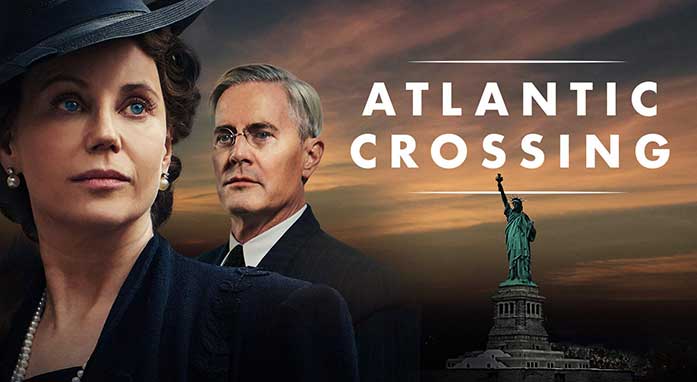 We’ve just finished watching the eight-part PBS series Atlantic Crossing. It’s an excellent drama that shines a light on an interesting aspect of Norway’s Second World War experience.
We’ve just finished watching the eight-part PBS series Atlantic Crossing. It’s an excellent drama that shines a light on an interesting aspect of Norway’s Second World War experience.
The main focus is on the relationship between Crown Princess Martha of Norway and U.S. President Franklin D. Roosevelt. In addition to his own anti-Nazi leanings, Roosevelt is quite taken with Martha, who in turn seeks to use her influence to Norway’s benefit.
Along with first-class writing and acting, Atlantic Crossing gets high marks for its historical fealty. Yes, there are some fictitious bits inserted for dramatic purposes. And its exploration of the intimate details of the Roosevelt/Martha relationship is necessarily speculative. But as historically-inspired dramas go, the series is unusually authentic.
After the April 1940 German invasion of Norway, the royal family split up for the duration of the war. Martha took the three children to the United States for safety. Meanwhile, her husband, Crown Prince Olav, and his father, King Haakon, relocated to London with the Norwegian government-in-exile.
It was an uncertain time. Prior to America’s entry into the war and the German defeat at Stalingrad, an ultimate Nazi victory was quite conceivable. And even after the tide turned, the road to liberation was long and tortured.
Atlantic Crossing captures the stresses and strains, sacrifices and sorrows inevitably associated with such a drawn-out struggle. And it also examines the impact of prolonged separation on Martha and Olav’s relationship, including the damage inflicted by suspicion, rumour and gossip.
Of the drama’s main protagonists, Roosevelt was the only one who didn’t survive the war. He died 26 days before Germany’s surrender.
Olav returned to Norway in May 1945 and was joined by Martha and the children the following month. They were received warmly and enjoyed great popularity.
Martha, however, didn’t become queen. She succumbed to cancer in 1954, more than three years before the death of her father-in-law and the subsequent succession of her husband. Olav reigned until 1991 but never remarried.
One character from Atlantic Crossing – Martha and Olav’s only son – remains a significant presence in contemporary Norwegian life. Now aged 84, he reigns as Harald V. He’s also a keen sportsman and represented Norway in sailing for three consecutive Olympics.
The Norwegian royals are a durable lot.
Known as the House of Glucksburg, their origins are traced to the border lands between Denmark and Germany. As early as 1450, one of the family became king of Norway. The current iteration dates to 1905, when Haakon – then a Danish prince – was offered the Norwegian throne after the union with Sweden dissolved.
And in typical fashion, the Glucksburgs have blood ties with other European royals. Harald is the great-great-grandson of Queen Victoria and a second cousin of Queen Elizabeth.
Harald’s lifetime has seen many changes. The Norway he was born into in 1937 differs significantly from the Norway of today.
Once relatively poor, Norway has been transformed by North Sea oil. It’s now one of the world’s richest countries, sitting on an oil-derived national investment fund valued at approximately $1 trillion. For a population just shy of 5.4 million, that’s a lot of per-capita wealth. And the largesse is widely distributed, making Norway one of the world’s most egalitarian societies.
Still, this wealth is husbanded carefully. The fund is invested in a wide range of international ventures and government spending from it is effectively tied to the annual yield. A country that experiences some of Europe’s wettest weather knows all about keeping something aside for a rainy day.
But broad prosperity notwithstanding, some worry that oil wealth has made Norway complacent, even soft. There are now jobs that Norwegians won’t do, preferring to either import workers or outsource to the likes of China. Filleting Norwegian fish is an example of the latter.
Norwegians also work substantially fewer hours, take longer holidays, use more sick leave and retire earlier than they once did. It’s a sweet deal as long as it lasts.
There are, though, a couple of respects in which Norway hasn’t changed much.
There’s the relationship with the landscape. Norwegians treasure their open-air life and rugged scenery. They also like their sense of distance. It remains Europe’s least densely populated country.
And Norwegians cherish a feisty independence. Twice in the last 50 years, voters have nixed the prospect of joining the European Union.
Troy Media columnist Pat Murphy casts a history buff’s eye at the goings-on in our world. Never cynical – well perhaps a little bit. For interview requests, click here.
The views, opinions and positions expressed by columnists and contributors are the authors’ alone. They do not inherently or expressly reflect the views, opinions and/or positions of our publication.
© Troy Media
Troy Media is an editorial content provider to media outlets and its own hosted community news outlets across Canada.

